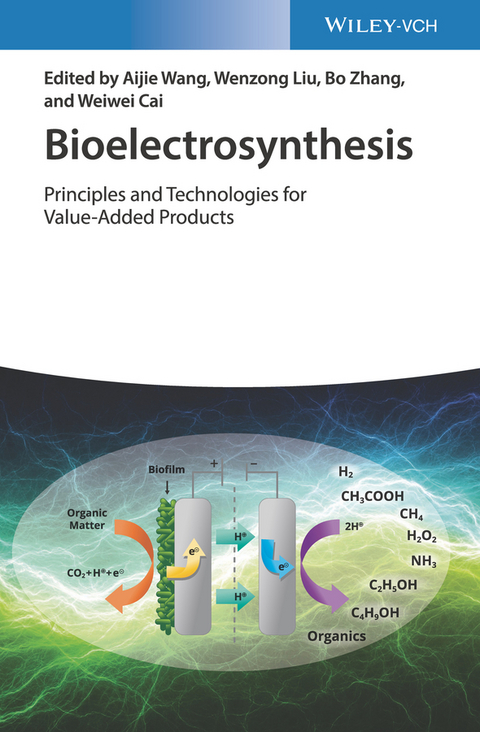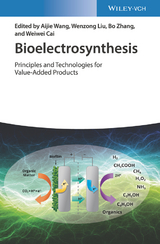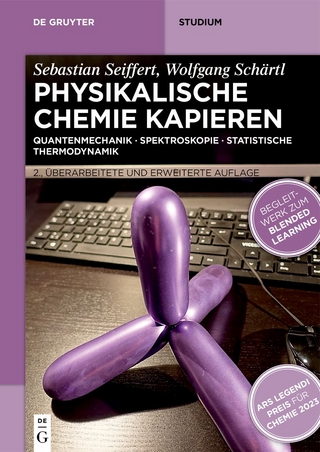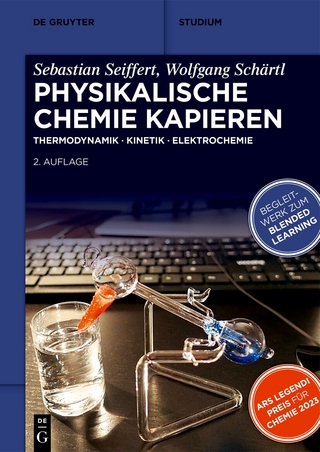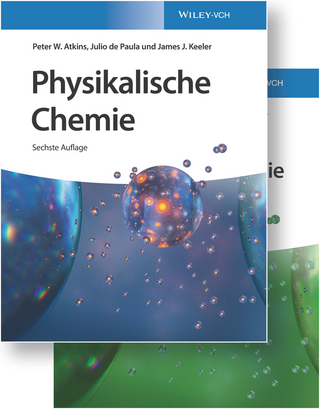Bioelectrosynthesis
Wiley-VCH (Verlag)
978-3-527-34378-2 (ISBN)
- Titel ist leider vergriffen;
keine Neuauflage - Artikel merken
Dr. Aijie Wang is the professor and director of School of Municipal & Environmental Engineering of Harbin Institute of Technology, and Research Center for Eco-Environmental Sciences (RCEES), Chinese Academy of Sciences (CAS). Her current interests are the wastewater biological treatment and resource recovery, bio(electro)degradation of environmental pollutants and corresponding mechanisms as well as the bioelectrochemical stimulated technology for recalcitrant compounds biodegradation. She has published more than 200 SCI-indexed papers and 3 monographs together with 40 granted Chinese patents. She is the recipient of several national academic awards, including a Distinguished Professor of Yangtze River Scholar (MOE of China) and a National Outstanding Youth Science Fund Award (NSFC). She is the member of "One-Hundred Talented" program of CAS, and the "Youth Science and Technology Innovation Leadership" of MOST of China. She is also the awardee of the National Science and Technology Progress Awards in 2004, 2007 and 2010 as well as China Industry-Academic Cooperation and Innovation Award in 2015. Meanwhile, she is also a Fellow of International Water Association. Dr. Wenzong Liu is an associate professor of RCEES, CAS since 2013. He received his B.S. in Bioengineering in 2005 from the University of Petroleum of China, and obtained his M.S. and Ph.D degree of Environmental Science and Engineering in 2007 and 2011 from Harbin Institute of Technology. His research interests are the electron transfer mechanism of bioelectrochemical degradation of organic pollutants, microbial ecology related to bioenergy and bioresource recovery. He has published more than 60 peer-reviewed papers. Dr. Liu has received several awards, including "Young Ambassador to America Society for Microbiology" in China (2012-2015), "Young Technology Innovation of Microbial Ecology Award" in 2012. Dr. Bo Zhang is an assistant professor at RCEES, CAS. He obtained his B.S. degree in environmental engineering from Nanjing University in 2007 and his M.S. degree and Ph.D. degree from Clarkson University and University of Wisconsin, Milwaukee, respectively. He then worked as a postdoc at RCEES in Prof. Aijie Wang's group. His research interests include bioelectrochemical systems and extracellular electron transfer in engineered and natural systems. Mr. Weiwei Cai is a PhD student in Harbin Institute of Technology. His main interests focus on Electron transfer of bioelectrochemical methane production; In situ accelerating and upgrading methane with aid of bioelectrochemistry; ecology dynamics related to bio(electro)-methanogenesis from wastes and wastewater; Molecular mechanism of bio-methanogenesis coupling emerging techniques (conductive carriers, bioelectrochemistry, novel nanomaterials and quorum sensing).
Table of Contents - Bioelectrosynthesis: Principles and Technologies for Value-Added Products
Section I: Principle and products overview of bioelectrosynthesis
Chapter 1: Principle and products overview of bioelectrosynthesis
Section II: Biogas production and upgrading technology via bioelectrolysis
Chapter 2: Hydrogen production from waste stream with microbial electrolysis cell
Chapter 3: A Promising Strategy for Renewable Energy Recovery: Conversion of Organic Wastes to Methane via Electromethanogenesis
Chapter 4: Microbial electrolysis Cell (MEC): an innovative waste to bioenergy and value-added byproducts technology
Chapter 5: Methane production at biocathodes: principles and applications
Section III: Organic synthesis on cathodes
Chapter 6: Organic synthesis on cathodes
Section IV: Chemical products and nitrogen recovery
Chapter 7: Inorganic compound synthesis in bioelectrochemical system: generation rate increase and application
Chapter 8: Bioelectrochemical ammonium production--Nitrogen removal and recovery in BES
Chapter 9: Bioelectrochemical systems for heavy metal pollution control and resource recovery
Section V: External electron transfer and electrode material promotion
Chapter 10: External electron transfer and electrode material promotion
Chapter 11: External electron transfer: Pathway, mechanism and microorganisms involved
Chapter 12: Extracellular electron transport of electroactive biofilm
Section VI: The microbiology of bioelectrosynthesis
Chapter 13: Microbial growth, ecological and metabolic characteristics in bioelectrosynthesis systems
Chapter 14: An update-perspective of electron transfer in electro-syntrophic-methanogenesis: from VFAs to methane
Chapter 15: Microbial metabolism kinetics and interactions in bioelectrosynthesis system
| Erscheinungsdatum | 15.08.2019 |
|---|---|
| Verlagsort | Weinheim |
| Sprache | englisch |
| Maße | 170 x 244 mm |
| Gewicht | 946 g |
| Themenwelt | Naturwissenschaften ► Biologie |
| Naturwissenschaften ► Chemie ► Physikalische Chemie | |
| Naturwissenschaften ► Chemie ► Technische Chemie | |
| Technik | |
| Schlagworte | Angewandte Mikrobiologie • applied microbiology • Bioelektrochemie • Biowissenschaften • chemical engineering • Chemie • Chemische Verfahrenstechnik • Chemistry • Electrochemistry • Elektrochemie • Industrial Chemistry • Life Sciences • Process Engineering • Prozesssteuerung • Technische u. Industrielle Chemie |
| ISBN-10 | 3-527-34378-4 / 3527343784 |
| ISBN-13 | 978-3-527-34378-2 / 9783527343782 |
| Zustand | Neuware |
| Informationen gemäß Produktsicherheitsverordnung (GPSR) | |
| Haben Sie eine Frage zum Produkt? |
aus dem Bereich
